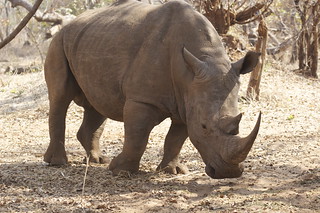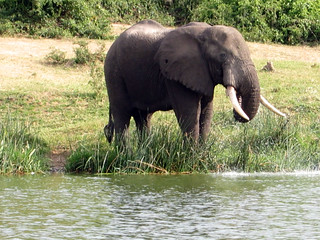Great news for environmentalists and wildlife advocates! It seems that the urgent need to protect Africa’s precious wildlife from poachers and illegal traffickers is being answered. In December of 2013, the Wildlife Conservation and Management bill was passed into law which aimed to enforce stricter enforcement of wildlife protection. On March 5th of this year, the Wildlife Crimes Unit officially started their efforts toward fighting the massive poaching problem in Kenya as part of the new law.

CC Image courtesy of SarahDepper on Flickr
“We are now well-equipped and ready to hit poachers hard,” explained Katto Wambua, new member of the Wildlife Crimes Unit and prosecution counsel in the office of the director of public prosecutions. He added that the unit will be a great asset to the war on poaching. The efforts have been fairly impressive so far. In less than a month, the team has been able to successfully close 26 cases against poachers. 15 of those cases had already been open, but were quickly resolved after being transferred to the KWS special prosecutors. The 26 cases had an impressive 78% conviction rate, especially compared to the police’s 20% conviction rate from January to March 5 when the Wildlife Crimes Unit began working.
The Director of Public Prosecutions, Keriako Tobiko, made a crucial decision to form the Widlife Crimes Unit. The unit aims to send a clear message to poachers, and the entire poaching industry, that wildlife crime will not be accepted in Kenya. “Prosecution will no longer be cited as the weak link in the justice process,” said Wambua. Much of the success of the new law is being credited to more collaboration and communication between KWS and law enforcement. “We regularly hold joint brainstorming sessions and training on the new laws and challenges to map out ways each actor could aid in the delivery of justice.”
The Kenya Wildlife Service (KWS) are doing what they can to protect and monitor the endangered species. “We have 975 wildlife rangers against a demand of more than 2,000 officers,” said KWS Director of Security Julius Kimani. “That is why we want to supplement their effort by deploying drones to survey parks.” Unfortunately, they are still waiting for some of the funding to come in through donations and other sources before they can actually afford to deploy drones. In the meantime, they are using the GPS units and other technology available to them. “We are using aircrafts fitted with surveillance cameras and GPS tracking systems to monitor endangered species,” explained Kimani. “We have also fitted microchips on rhino horns in a bid to monitor their movements.”

CC Image courtesy of sarahemcc on Flickr
The major targets of the poaching industry are rhinos and elephants, slaughtered for their valuable ivory. It is gruesome and sad to most of us. It’s hard to imagine that such massive beasts as vulnerable. One would like to think an elephant could defend itself, but their dwindling numbers can’t be ignored. Their large size makes them easier to see from a distance, especially with binoculars or from a helicopter or other aircraft. Poachers are using heavy-duty guns to be able to shoot and kill elephants and rhinos from a safe (for the poachers) distance.
What’s more upsetting (to this writer at least) are the people funding and arming the poachers. Poachers often only take the job because there are few other viable opportunities to feed themselves and their families. In fact, a while back there was another effort put forward to deter poaching that worked very well: offer the poachers a job providing security for the wildlife reserves. One great aspect of the Wildlife Crimes Unit, is that it goes after all facets of the poaching industry.
One of the new provisions of the law allow prosecutors to ask magistrates and judges to not let poachers out on bond. “This way, we make sure they are not released and [that they do not] end up tampering with the evidence, intimidate witnesses, abscond from court proceedings or go back to poaching as many did,” Wambua explained.
One investigation officer from the Criminal Investigation Department in Nairobi, David Waweru, noticed a boost in effort towards fighting poachers and ivory traffickers since the Wildlife Crimes Unit was formed. Investigators were encouraged that their efforts would not “gather dust on the shelves of overwhelmed police and KWS prosecutors as it was before.” During the first three months of 2014, a whopping 253 poachers and traffickers have been arrested in Kenya.
“We have actually increased hours of surveillance against organized poaching rings and infiltrated their network,” Waweru said. He credits the improved quality of their investigation has led to much better success rates in persecutions. “I have confidence the combination of thorough detective work and timely, quality prosecutions will discourage would-be poachers through fear of legal punishment.”
New Wildlife Crimes Unit Fights Poaching in Kenya along with GPS Tracking

No comments:
Post a Comment